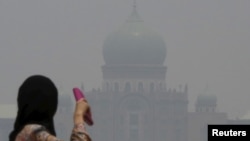Officials in Thailand are warning that smoke from Indonesia’s massive rainforest fires is affecting public health in four southern provinces.
For weeks, haze from Indonesia’s land clearing has prompted health alerts in that country, as well as in Brunei, Malaysia and Singapore.
Poor air quality has led to cancellations of classes, sporting events and other activities.
Indonesian farmers and developers routinely burn rainforest to clear land at this time of year, but a large rise in palm oil production is blamed for the massive fires and the resulting haze. NASA forecasts this year’s fires will become the region’s worst on record.
Although the pollution spreads across the region, so too do the profits from businesses behind the land clearing. Indonesian, Malaysian and Singaporean investors and companies have close links with the politicians and officials in Indonesia, creating a conflict of interest, according to those who have studied the issue.
“Once they retire from the government, they are re-employed in these companies as advisers and as other positions to maintain this relationship with the present government,” said Helena Binti Muhamad Varkkey, deputy executive director of the Asia-Europe Institute at the University of Malaya.
No punishments for polluters
The Association of Southeast Asian Nations has been trying to mitigate the issue for decades, in part through its agreement on trans-boundary haze pollution, which Indonesia ratified last year.
“There is no dispute settlement, there is no enforcement, there is no punishment mechanism in the agreement. So even though it is supposed to be legally binding, it is pretty much still up to Indonesia whether or not they want to really follow the rules and all that spelled out in the agreement,” Varkkey, author of The Haze Problem in Southeast Asia, told VOA.
The answer to the problem, according to Varkkey, is not banning palm oil production, important to the economies of Indonesia and Malaysia. Rather, she advocates using other, ample forestland instead of the more desirable, sparsely populated but fire-prone peat lands.
“When fires occur on these really dry peat lands, they produce the very thick, black smoke that can travel across national boundaries, and this is what produces the haze that we find today,” said Varkkey.
Environmental organizations such as the World Wide Fund for Nature are taking a multipronged approach to combating the problem.
WWF is raising consumers' awareness, claiming half the products in supermarkets contain palm oil, including pizza, ice cream, toothpaste and lipstick. (WWF PSA in Singapore)
It also advocates sustainable lending practices for commercial logging, palm oil and pulp production, something Singapore's powerful banks are examining.
Only four major banks in Indonesia, Malaysia and Singapore take environmental factors into consideration for credit decisions, according to a WWF report.
Some argue shutting down pools of capital available to polluters could have more impact than pursuits by law enforcement.
“Currently the threat of being prosecuted depends on whether there is an adequate police force in the region and investigations,” said Jeanne Stampe, WWF International's Asia finance and commodities specialist.
“Whereas upfront if their lenders and investors are starting to ask them about their practices and requiring them to make certain commitments, then it is very hard for them to escape effectively or continuing going under the radar.”
Billions in losses
The status quo is costing big money. This year's fires and resulting commercial losses are expected to surpass the price from the 1997-98 rainforest fires that cost the regional economies an estimated $9 billion, according to ASEAN.
Indonesia on Tuesday defended its handling of the massive fires on Sumatra and Borneo, saying it was doing all it could to extinguish them.
Willem Ranpangilei, head of the National Agency for Disaster Management, told reporters that officials were planning to test 40 tons of a chemical compound that could help extinguish the fires without causing more smoke.
Critics have urged Indonesia to crack down on the setting of fires by companies to make way for palm oil plantations. Siti Nurbaya, minister of environmental and forestry affairs, said 30 corporate permits wouild be revoked and more than 420 corporations were being investigated.
More than 22,000 police and military personnel have been deployed to combat more than 1,600 fires spread across six provinces.
But their attempts to extinguish the current estimated 1,800 hot spots in Indonesia are being hampered by a lack of equipment and water.
"Because of the haze I'm having respiratory problem" said Zainal, a resident from Jambi on Sumatra. “I feel terrible.”
Millions of other residents in the region can empathize.
Parents in Pekanbaru, the capital of Riau province on Sumatra, took their babies to the air-conditioned governor's office Tuesday as part of an evacuation.
“It's safe here because this place is sterilized. The air is clean, unlike outside,” said one mother, Nur Habiba Al Ashraf. “My child was coughing before he came here, but now he's fine.”
The haze is not only affecting humans.
At the BOS Nyaru Menteng Orangutan Rescue Center in Central Kalimantan province of Indonesian Borneo, 16 orangutan babies have been diagnosed with acute respiratory infections.
“I am very worried if such conditions continue, there will be a lot of orangutans that become sick or have some sort of relapse due to the bad air quality,” said program manager Denny Krniawan. “They could possibly even die.”
VOA's Fathiyah Wardah contributed to this story from Jakarta, Indonesia.












